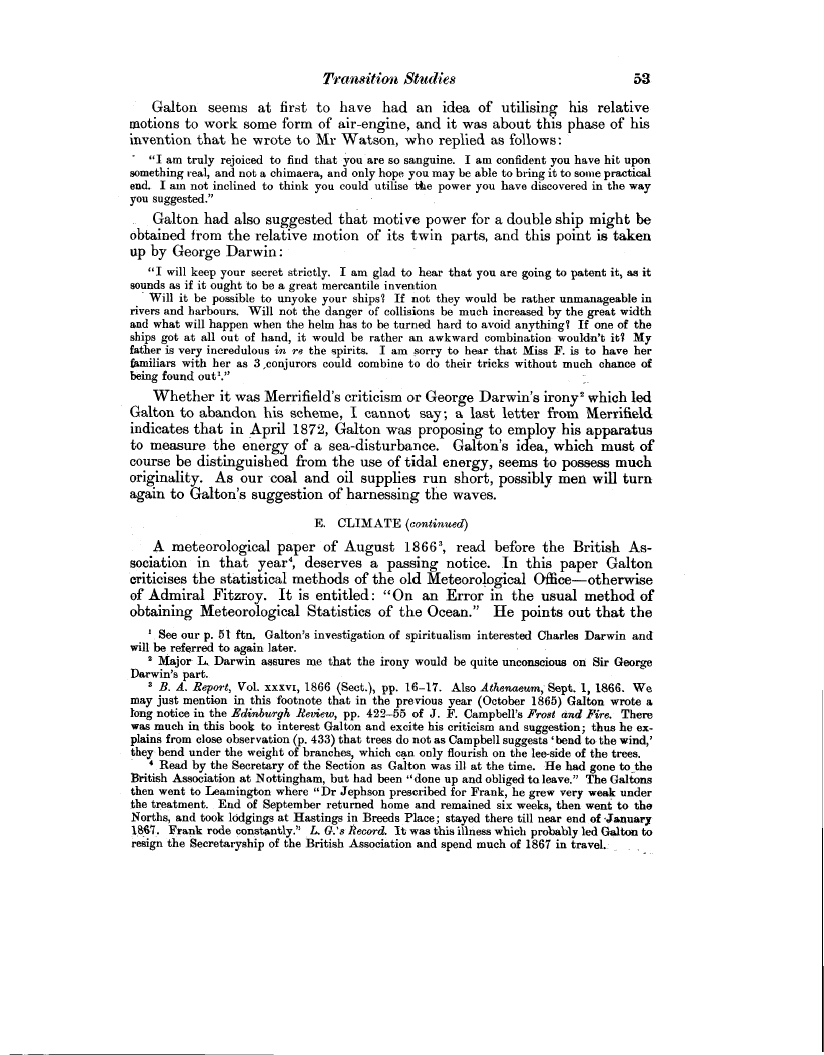Transition Studies 53
Galton seems at first to have had an idea of utilising his relative motions to work some form of air-engine, and it was about this phase of his invention that he wrote to Mr Watson, who replied as follows:
"I am truly rejoiced to find that you are so sanguine. I am confident you have hit upon something real, and not a chimaera, and only hope you may be able to bring it to some practical end. I am not inclined to think you could utilise the power you have discovered in the way you suggested."
. Galton had also suggested that motive power for a double ship might be obtained from the relative motion of its twin parts, and this point is taken up by George Darwin
"I will keep your secret strictly. I am glad to hear that you are going to patent it, as it sounds as if it ought to be a great mercantile invention
Will it be possible to unyoke your ships? If not they would be rather unmanageable in rivers and harbours. Will not the danger of collisions be much increased by the great width and what will happen when the helm has to he turned hard to avoid anything? If one of the ships got at all out of hand, it would be rather an awkward combination- wouldn't it? My father is very incredulous in re the spirits. I am sorry to hear that Miss F. is to have her familiars with her as 3 ,conjurors could combine to do their tricks without much chance of being found out'."
Whether it was Merrifield's criticism or George Darwin's irony 2 which led Galton to abandon his scheme, I cannot say ; a last letter from Merrifield indicates that in April 1872, Galton was proposing to employ his apparatus to measure the energy of a sea-disturbance. Galton's idea, which must of course be distinguished from the use of tidal energy, seems to possess much originality. As our coal and oil supplies run short, possibly men will turn again to Galton's suggestion of harnessing the waves.
E. CLIMATE (continued)
A meteorological paper of August 18663, read before the British Association in that year", deserves a passing notice. In this paper Galton criticises the statistical methods of the old Meteorological Office-otherwise of Admiral Fitzroy. It is entitled : "On an Error in the usual method of obtaining Meteorological Statistics of the Ocean." He points out that the
' See our p. 51 ftn. Galton's investigation of spiritualism interested Charles Darwin and will be referred to again later.
2 Major L.. Darwin assures me that the irony would be quite unconscious on Sir George Darwin's part.
3 B. A. Report, Vol. xxxvi, 1866 (Sect.), pp. 16-17. Also Athenaeum, Sept. 1, 1866. We may just mention in this footnote that in the previous year (October 1865) Galton wrote a long notice in the Edinburgh Review, pp. 422-55 of J. F. Campbell's Frost and Fire. There was much in this book to interest Galton and excite his criticism and suggestion; thus he explains from close observation (p. 433) that trees do not as Campbell suggests `bend to the wind,' they bend under the weight of branches, which can only flourish on the lee-side of the trees.
4 Read by the Secretary of the Section as Galton was ill at the time. He had gone to- the British Association at Nottingham, but had been "done up and obliged to leave." The Galtons then went to Leamington where "Dr Jephson prescribed for Frank, he grew very weak under the treatment. End of September returned home and remained six weeks, then went to the Norths, and took lodgings at Hastings in Breeds Place; stayed there till near end of January 1867. Frank rode constantly." L. G.'s &cord. It was this illness which probably led Galton to resign the Secretaryship of the British Association and spend much of 1867 in travel.

